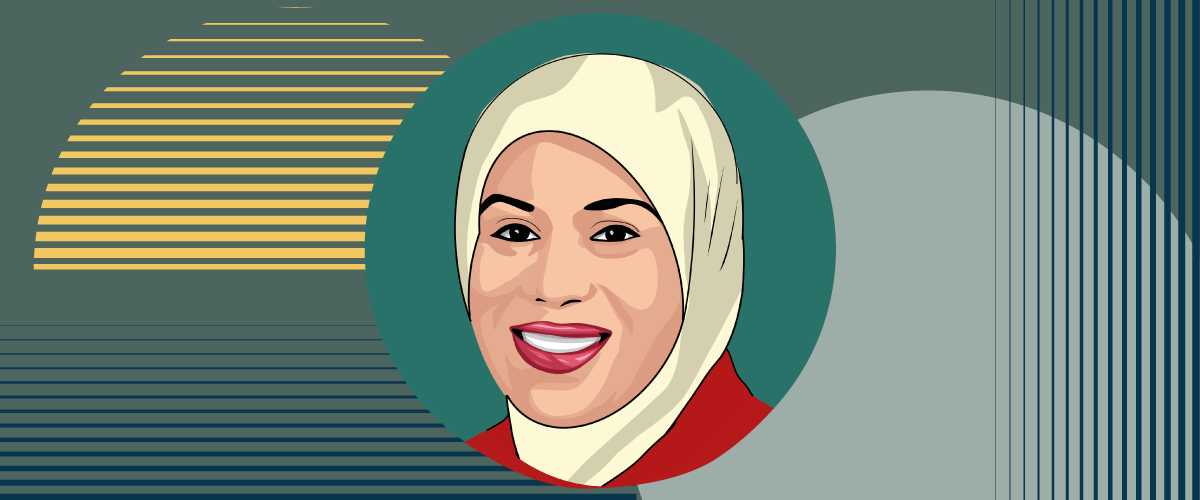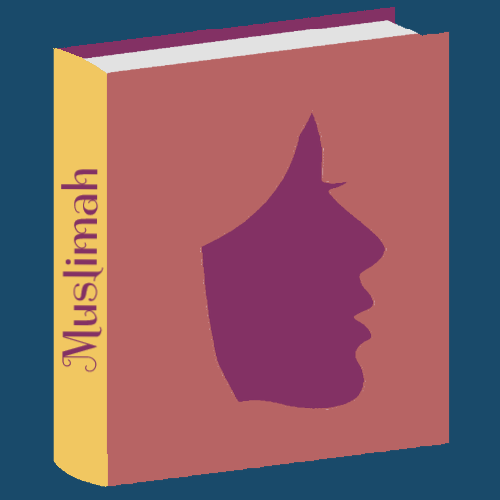
Finding Purpose, Building Community — Fariba Chaghand
—by Nasreen NasreenFariba is a well-known face of the Sunnydale Community Centre. For over 15 years she has been steadily employed in this neighbourhood in north Waterloo. Fariba has become a gentle human presence, an anchor for a vibrant community that bustles with change and with life. And it can be said that transition and change make her story one of surprises and perseverance. It is also, perhaps, a story of a phenomenal woman working for her community, even when life (and God, she would add) gave her plenty of excuses not to do so.
Fariba was born during the 1960s in Iran. Growing up with one brother and two sisters, she describes her family as “middle-class, open-minded and not particularly religious.” Books played a major role in their home. From a young age, her parents introduced their children to the world’s great literary masterpieces. Education was important, excellence was expected and so was community service. Young Fariba developed an interest in science. When she was 16 years old, Fariba started questioning her purpose in life. After extensive study, she found answers in the faith of her ancestors, not in science. It was ‘Irfan, Islamic mysticism, that shaped Fariba’s choices in life from this point onwards. She studied Humanities, Theology and Interreligious Studies at the University of Tehran, and was a teacher for three years afterwards. Fariba loved teaching.
In 1990, Fariba and her family arrived in Waterloo Region. Her husband was pursuing a Ph.D., and Fariba and their two young daughters accompanied him. The young family felt lost in their new community. Waterloo wasn’t particularly diverse; there weren’t many programs or services to support them, or other newcomers in general. It was a challenging time for the family, and Fariba struggled to find opportunities to make herself useful. She needed to establish a sense of focus in this new community that she now called home.
Fariba has told and will always tell women new to Canada that they have to work on two things: language and skills. Fariba accomplished this herself; she is a strong believer that women should be active participants of society. She began volunteering almost immediately after arriving in Canada within her cultural and faith communities. Once she was confident in her English, she started to branch out. The list of organizations Fariba has volunteered with is long and varied. It gave her life some measure of purpose, but it wasn’t enough for her.
In the 1990s, Fariba noticed how important computers were becoming in workplaces and in all aspects of life. Although she didn’t know much about computers, but she was committed to changing that. She enrolled in computer classes. Never one to do things by half, Fariba proceeded to get her Microsoft Specialist certificate, with excellence. Now a computer expert, Fariba started teaching again. “Once a teacher, always a teacher.” She knew that many immigrant women didn’t have access to technology and therefore no computer skills or opportunity to change that. Being able to use a computer was becoming essential to finding a job in Canada. Fariba taught basic computer classes at a local employment agency for about 10 years. “I just couldn’t keep teaching out of my life.”
In the early 2000s, Fariba got a job as a Computer Instructor and a Youth Program Supervisor at Sunnydale Community Centre in Waterloo. It was there and then that she started her career with the House of Friendship. Despite the nominal wages at the time, Fariba fell deeply in love with community work. She had found her purpose in Canada.
This computer class was an opportunity for Fariba to shine. Most of the potential students in the community were women with different ethnic and religious backgrounds. Many had not felt at ease being taught by a man. Once Fariba took over, word about a female teacher spread fast in the Sunnydale community. Almost overnight, Fariba’s computer classes were filled, mainly with women. There was now even a waiting list!
Fariba wholly enjoyed facilitating programs. One of her best memories comes from facilitating the Healthy Lifestyles program. The program focused on self-care, family care and community care. Through the program, she created strong connections with many women in the community. “Many of these women have become successful in their own right. They still come up to me to tell me how important this program was to them, and how it has helped them.”
In 2006, the position of Family Outreach Worker in Sunnydale came available. Fariba was excited by this opportunity and applied. Community work was where her heart was, and she knew the Sunnydale neighbourhood well by now; they knew her as well. She got the job, which was a part-time position. At that time, in 2006, she was the first non-white Family Outreach Worker in the Region of Waterloo. Today, many of the outreach workers are of different ethnic and racial backgrounds, reflecting the people they serve. A couple of years later, the job became full-time, and Fariba, who had often worked multiple jobs at the time, decided to now focus on this position only.
Sunnydale is home to a wide variety of people. There are newcomer families, single-parent households, and a lot of children and youth. Most are living on limited incomes. While the City of Waterloo is supposed to be more well-off than Kitchener in general, there aren’t as many services available for low-income families, and resources are few and far between in the city. “Sunnydale may be a community in need of support and resources; it is also very generous in giving back to others.” Fariba is likely one of Sunnydale’s strongest advocates.
At the centre of this unique neighbourhood lies the Sunnydale Community Centre. Located in a five-bedroom townhouse, it is always abuzz with activities and home of many programs ran by the House of Friendship and other organizations. It also is where Fariba’s office is located, and where she meets the families in her community and supports them on their journeys. Many of the families are immigrants and refugees, and Fariba often remembers the difficult days when she and her family first settled in Waterloo Region. “I don’t want other families to experience the same challenges we faced. I want to be there for them.”
After a couple of years of working in her new position, Fariba began to feel tired; she lacked energy, and was just not feeling well overall. She had a conversation with her sister in Iran. Her sister had a thought: “I think you might be pregnant!”
She was pregnant. A surprise for anyone, but especially for Fariba. She had thought that her childbearing years were long behind her. The initial surprise soon gave way to a feeling of determination. Fariba was committed to her work and her community. Her work had become busier as well; the area she was covering now included North Waterloo and the Lakeshore area. She decided she would take maternity leave and would continue working afterwards. Her work was important to her and her well-being.
Less than a year after Fariba returned to work from her maternity leave, she noticed a lump in her breast. Another surprise, but of a completely different kind. It was breast cancer. While there were many things that were unclear at that time, there was one thing that Fariba was very clear about: she needed to keep working for as long as she could.
Fariba continued her position part-time. She underwent a lumpectomy, followed by eight chemotherapy treatments and over 30 radiation sequences. Her work gave her great joy and purpose. “I always kept working, part-time. I maybe took a few days off here and there after a treatment, but work was really important to me. Work gave me the strength to go through treatments. It recharged my batteries.”
It was during this turbulent time of her diagnosis and cancer treatments that the Coalition of Muslim Women (CMW) offered their first public event. Fariba was fully aware of the work, programs and events of the Coalition. She had come to admire the work they were doing: empowering Muslim women and building bridges with the larger community. Having to focus on making a full recovery through a gruelling chemo and radiation process, she often didn’t have the energy to attend the Coalition’s events, let alone become an active member. She did, however, make a point of referring people to the CMW and its programs and services. The feedback she was receiving about the Coalition’s programs and events was always positive. “I have always had a lot of confidence in the Coalition!”
She remembers connecting a family to the CMW’s Hate Crimes Project. Through that project, a meeting was arranged for the family with a local newspaper, and their hate crime story was published as a feature article. Fariba considered this a success; the story of a family in her community had received the platform it deserved.
In recent years, Fariba has become more active with the CMW. She finally became a member three years ago. She knows many of the members personally and has attended quite a few of the events. It was the emphasis on food, festivity and artistic expression that drew her in. The Coalition, in her opinion, has changed the face of Islam in the Kitchener-Waterloo community. “For the first time in the region there weren’t only old serious men representing the Muslim community. There were now approachable and relatable women speaking clear messages of belonging and peace.” The work the CMW has done, was work that could only be done by women. Fariba is very sure of this.
Over the last few years, Fariba has enjoyed being part of community events such as the “Tea and Tales” project. Through this project, she has finally had the ability to showcase her country’s rich heritage and traditions away from the media. Fariba has taken the opportunity to share how much value Iranians put on the education of girls. The majority of university students in Iran are female and a growing number of women are employed by Iranian universities. Time and time again this information about Iran surprised the audience,. Fariba takes great pride in being able to break down stereotypes.
She also values the fact that she has been able to support “her” families through the training opportunities from the CMW. So many families in the community she serves are lost in the system and left behind. The Huquq human rights training was very helpful to Fariba in order to keep supporting these families.
Waterloo Region has changed so much since the early 1990s when Fariba and her family settled there. “The Coalition is the best thing that ever happened to this community,” Fariba states. Many families from northern Waterloo would argue that it is Fariba, the tireless Family Outreach Worker and volunteer at so many organizations, who has changed Waterloo Region. “What keeps me going is seeing people that I walked with, that I helped, who are now thriving.” Fariba pauses, and adds that she has still so much work to do. “I don’t think about retiring, I just really love my work and hope to work for a long time yet!” After all, Fariba hasn’t accomplished her mission yet: to help build a healthy community, where everyone can belong and thrive.
